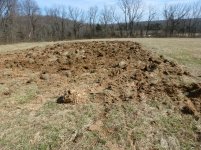daugen
Super Star Member
I am starting a new 50X100 garden in a field, which has currently been subsoiled, then will be plowed, then rototilled til fine. After taking out three million rocks. Clay, rocky, Bucks County PA typical soil. Lots of granite, and all kinds of quarries nearby, so my new garden comes with a few challenges.
The largest one actually to me is how to raise corn, sunflowers, big pumpkins, squash, cucumbers, etc much of which needs plenty of fertilizer, to grow nicely and not use Orthos's finest?
I'm willing to pay for the convenience of bagged fertilizer, as in bone meal, dried manure, whatever the local Agway has to offer. Will apply before the last rototilling to mix it in properly. I have always had mulch piles that have produced wonderful soil, we even plant our tomatoes in ours at home and get amazing results. So how to infuse some life into a fallow field and still have my sister who eats only organic food not turn up her nose at it. She loved our tomatoes last year; we just didn't tell her how well Miracle Grow worked on them and she really didn't want to ask.
I grew up reading Rodale and Organic Gardening. Over time I will transfer the contents of a big mulch pile into the dirt in this garden. But what can you all suggest for the first year, trying to stay as natural as possible. And no overwhelming smells please so six loads of pig slurry, well, no thanks.
The largest one actually to me is how to raise corn, sunflowers, big pumpkins, squash, cucumbers, etc much of which needs plenty of fertilizer, to grow nicely and not use Orthos's finest?
I'm willing to pay for the convenience of bagged fertilizer, as in bone meal, dried manure, whatever the local Agway has to offer. Will apply before the last rototilling to mix it in properly. I have always had mulch piles that have produced wonderful soil, we even plant our tomatoes in ours at home and get amazing results. So how to infuse some life into a fallow field and still have my sister who eats only organic food not turn up her nose at it. She loved our tomatoes last year; we just didn't tell her how well Miracle Grow worked on them and she really didn't want to ask.
I grew up reading Rodale and Organic Gardening. Over time I will transfer the contents of a big mulch pile into the dirt in this garden. But what can you all suggest for the first year, trying to stay as natural as possible. And no overwhelming smells please so six loads of pig slurry, well, no thanks.
